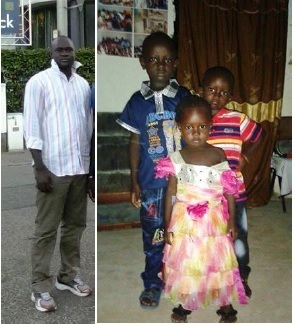
(Picture – My friend and his children)
The plight of a young friend from The Gambia epitomizes for me much of what is wrong in the world.
When we met in 2011, he was volunteer school master in a tiny rustic school with 50 young children (3-7 years old), which had been built by benevolent British donors.
My friend had achieved Grade 12 and wanted to ensure that other children in his village had the same chance. He was further educating himself at a local college during school breaks.
Several months ago when he contacted me, I was surprised to learn that he was interned in a refugee camp in Italy.
He had made the dangerous journey across the desert to Libya and had taken one of those shoddy boats frequently featured on the news about people drowning. Many others die abandoned in the desert by the same gangs with no food and no water when their rickety vans fall apart.
After several months stagnation in the overfilled camp in Italy he recently made another perilous journey to Germany in search of a country willing to accept him.
As an unregistered immigrant, this journey was as dangerous as the other. He could have been arrested, abused or captured by one of the many gangs engaged in human trafficking and sold. He is young, healthy and educated so he would be a valuable commodity. Luckily, he was only stopped and registered by the police in Germany and directed to a similar camp; this one more crowded.
He didn’t do this for the adventure, but because he felt he had no choice, in order to find a means to support his young family, whom he feared would not move beyond a life of poverty.
Instead of the world leaders addressing the real problems at the root of this unprecedented migration (perishing poverty spawning terrorism and war) they procrastinate, ruminate and hide under the cloak of diplomacy.
The Europeans attempt to stop the migration and argue among themselves who should accept these people. Canada and the United States, because of the ocean separating these migrants have imposed draconian immigration laws and slashed benefits for migrants.
It is obvious that international development approaches have been a abject failure. The “too big to fail” governments, businesses, banks, international institutions and non-governmental organizations (NGOs) have failed miserably.
There is another way. This entails empowering local people in developed countries to help.
I witnessed it first hand in The Gambia. Small Dutch foundations and associations, which are operated by individuals, families or a few friends come to Gambia and work with local people to build schools, water systems, electrical systems, farms and much more.
There have no need for elaborate offices, expensive 4×4 Toyotas or costly overheads; not even paid staff.
It is obvious that international development approaches have been a abject failure. The ‘too big to fail’ governments, businesses, banks, international institutions and non-governmental organizations have failed miserably.
These people come with a few thousand dollars and in consultation with a village initiate a project (sometimes more than once a year) which they then help them complete. They go home knowing their accomplishment has made a difference.
This is possible because the Netherlands supports small foundations and charitable associations with easy registration, and a generous taxation scheme. They do require governance, transparency and accountability.
One report of 2011 suggested that there were 182,000 foundations and 125,425 charitable associations in the Netherlands at that time.
In Canada, many people pay NGOs a lot of money to volunteer in a foreign country for a two week experience.
There are others who have gone to foreign countries to work with local people. Many rely on churches or other Canadian charities for support. Most struggle to continue their work.
In my recent article, “Charity and its demise,” I touched on many of the constraints facing charitable organizations and charitable giving in Canada.
My own attempts these past few months to establish a small charitable foundation to assist my work in Africa has caused mostly frustration and despair. Colleagues and experts in this field tell me it is an impossibility in Canada.
What if Canada (and other countries) followed the Dutch model and unleashed the passion and kindness of its people allowing a similar model of charitable organization to appear.
People could organize their own projects and raise their own funds all of which would be spent on the charitable cause chosen. It would require research, networking and consultation with the community or village they choose to help and would be an educational experience of great value for both.
The value of the experience and the positive impact of affecting others would begin a rejuvenation process for everyone and an opportunity to build the cultural and humanitarian bridges that are an imperative in the world today.
All that is required is for the government to instigate new legislation and big institutions of all types to step aside and allow the little people to take over.
It has always been the little people who have to change the world for the better, after big institutions and systems have created havoc, chaos and destruction.
Written by Bill Pardy
July 29th, 2015

